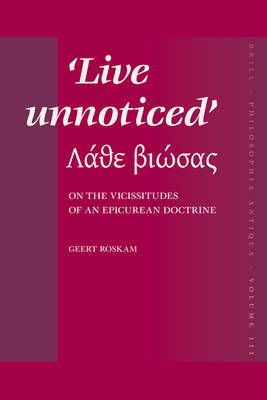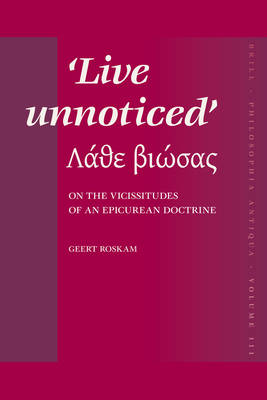
- Afhalen na 1 uur in een winkel met voorraad
- Gratis thuislevering in België vanaf € 30
- Ruim aanbod met 7 miljoen producten
- Afhalen na 1 uur in een winkel met voorraad
- Gratis thuislevering in België vanaf € 30
- Ruim aanbod met 7 miljoen producten
Zoeken
Omschrijving
Against the background of age-old Greek wisdom, Epicurus' advice to 'live unnoticed' (lathe biosas) was particularly provocative and scandalous. Why, after all, would an unknown Greek soldier in Agamemnon's army have been happier than famous Achilles? Or why should an ordinary Athenian be regarded as more blessed and enviable than Pericles? Yet Epicurus' ideal was far from unattractive, guaranteeing as it did a quiet and untroubled existence far from the dangerous turmoil of public life.
This book casts new light on Epicurus' socio-political philosophy through a careful analysis of his arguments. It also shows how the ideal of an 'unnoticed life' was received during the later history of Epicureanism and how it occasionally occurs in ancient Latin poetry.
This book casts new light on Epicurus' socio-political philosophy through a careful analysis of his arguments. It also shows how the ideal of an 'unnoticed life' was received during the later history of Epicureanism and how it occasionally occurs in ancient Latin poetry.
Specificaties
Betrokkenen
- Auteur(s):
- Uitgeverij:
Inhoud
- Aantal bladzijden:
- 248
- Taal:
- Engels
- Reeks:
- Reeksnummer:
- nr. 111
Eigenschappen
- Productcode (EAN):
- 9789004161719
- Verschijningsdatum:
- 22/06/2007
- Uitvoering:
- Hardcover
- Formaat:
- Genaaid
- Afmetingen:
- 172 mm x 241 mm
- Gewicht:
- 589 g

Alleen bij Standaard Boekhandel
+ 448 punten op je klantenkaart van Standaard Boekhandel
Beoordelingen
We publiceren alleen reviews die voldoen aan de voorwaarden voor reviews. Bekijk onze voorwaarden voor reviews.








